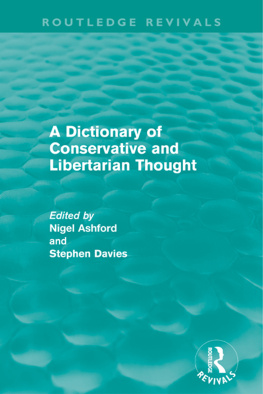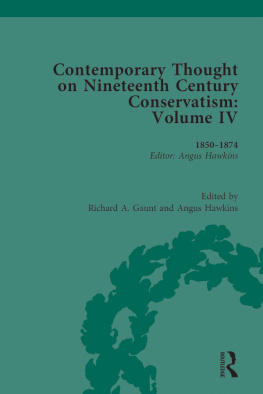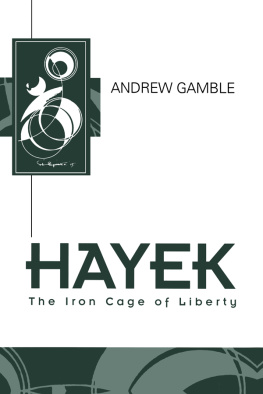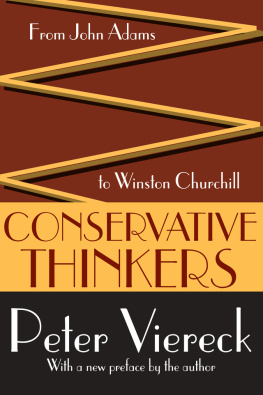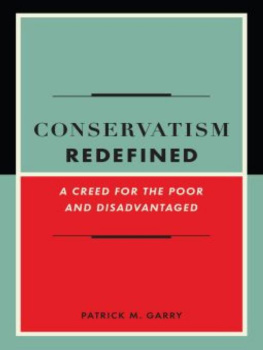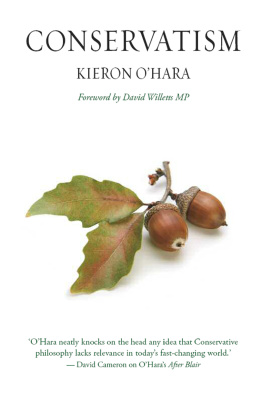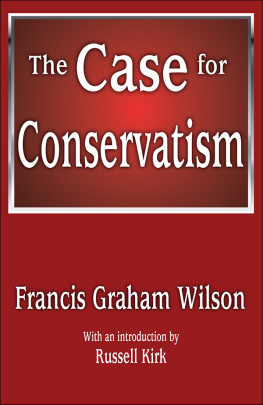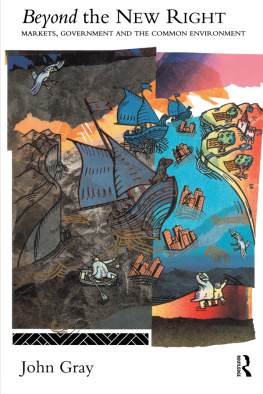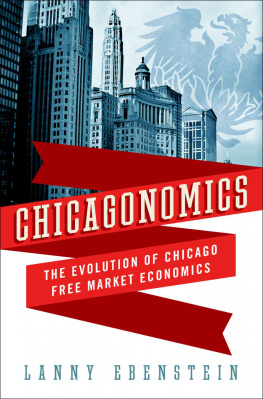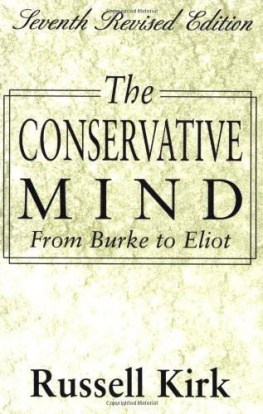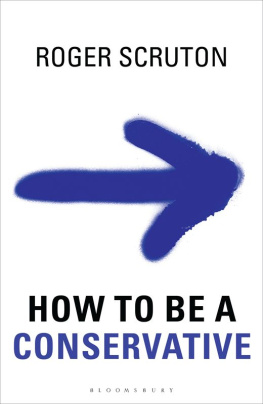Routledge Revivals
A Dictionary of Conservative and
Libertarian Thought
First published in 1991, this is a reissue of the path-breaking Dictionary of Conservative and Libertarian Thought, the first book to examine the ideals and arguments produced by the intellectual traditions of both conservatism and classical liberalism.
Covering the ideas of many such distinguished thinkers as Hayek, Scruton, Friedman and Buchanan, the volume provides a valuable survey of the historical development of both schools of thought in all of the major western countries and their contributions to contemporary debates.
From American Conservatism to French Liberalism, Invisible Hand to Organic Society, from Scientism to Scepticism and Utopianism to Voluntarism, this is a vital work whose reissue will be welcomed as much by the keen layperson as by students of political science, the history of philosophy, economics and public policy.
A Dictionary of Conservative
and Libertarian Thought
Edited by
Nigel Ashford and Stephen Davies
First published in 1991
by Routledge
This edition first published in 2011 by Routledge
2 Park Square, Milton Park, Abingdon, Oxon, OX14 4RN
Simultaneously published in the USA and Canada
by Routledge
270 Madison Avenue, New York, NY 10016
Routledge is an imprint of the Taylor & Francis Group, an informa business
1991 Nigel Ashford and Stephen Davies
All rights reserved. No part of this book may be reprinted or reproduced or utilised in any form or by any electronic, mechanical, or other means, now known or hereafter invented, including photocopying and recording, or in any information storage or retrieval system, without permission in writing from the publishers.
Publisher's Note
The publisher has gone to great lengths to ensure the quality of this reprint but points out that some imperfections in the original copies may be apparent.
Disclaimer
The publisher has made every effort to trace copyright holders and welcomes correspondence from those they have been unable to contact.
A Library of Congress record exists under ISBN: 0415003024
ISBN 13: 978-0-415-67046-3 (hbk)
ISBN 13: 978-0-203-81460-4 (ebk)
A Dictionary of Conservative
and Libertarian Thought
Edited by
Nigel Ashford and Stephen Davies
First published 1991
by Routledge
11 New Fetter Lane, London EC4P 4EE
Simultaneously published in the USA and Canada
by Routledge
a division of Routledge, Chapman and Hall, Inc.
29 West 35th Street, New York, NY 10001
1991 Nigel Ashford and Stephen Davies
Set in 10/12 pt Times, Linotron 202
by Florencetype Limited, Avon
Printed in England
by Clays Ltd, St Ives plc
All rights reserved. No part of this book may be reprinted or reproduced or utilized in any form or by any electronic, mechanical, or other means, now known or hereafter invented, including photocopying and recording, or in any information storage or retrieval system, without permission in writing from the publishers.
British Library Cataloguing in Publication Data
A Dictionary of Conservative and Libertarian Thought.
1. Political ideologies
I. Ashford, Nigel II. Davies, Stephen
320.5
Library of Congress Cataloging in Publication Data
A dictionary of conservative and libertarian thought / edited
by Nigel Ashford and Stephen Davies.
p. cm.
Includes index.
ISBN 0415003024 (h/b)
1. Conservatism-Dictionaries. 2. Liberalism
Dictionaries.
I. Ashford, Nigel. II. Davies, Stephen.
JA61.D5 1991
320.5203-dc20 90-47907
ISBN 0415003024
Contributors
Nigel Ashford is Senior Lecturer in Politics at Staffordshire Polytechnic
Norman Barry is Professor of Politics at the University of Buckingham
Christie Davies is Professor of Sociology at the University of Reading
Stephen Davies is Senior Lecturer in History at Manchester Polytechnic
Antony Flew is Emeritus Professor of Philosophy at the University of Reading
David Gordon is a freelance writer, based in the United States
R.A.D. Grant is Lecturer in English at the University of Glasgow
Wolfgang Grassl is Director of the Austrian Hoteliers Association
Paul Helm is Lecturer in Philosophy at the University of Liverpool
Alexander Shand was Lecturer in Economics at Manchester Polytechnic (retired)
Barry Smith is Professor of Philosophy at the International Academy of Philosophy, Liechtenstein
Introduction
In 1960 a reviewer of Hayek's Constitution of Liberty described the author as a magnificent dinosaur. The previous year Daniel Bell had published a highly regarded and influential work, The End of Ideology. Both articulated a common assumption of the time: that the major ideological or philosophical questions of public policy had been largely settled. This assumption in turn reflected the domination of public debate and policy formation by a social democratic consensus, shared by both left and right, consisting of support for an interventionist form of market economy, a redistributionist welfare state, and a politics dominated by questions of technique and ability rather than theory and principle. To this way of thinking political philosophy of any kind seemed otiose and useless and the traditional philosophies of socialism, conservatism, and classical liberalism such as Hayek's little more than historical curiosities.
The thirty years since then have seen a near revolution in political thought, accompanied by a sharp turn in practice. This has been most marked in the United States and Britain but has affected every major western democracy and much of the rest of the world as well. The once secure social democratic consensus is in disarray, confounded by the stagflation of the 1970s, the ever rising costs of the welfare state, and growing evidence of the incapacity of the state. At the same time political philosophy has been rejuvenated and the dinosaurs have shown unexpected resilience.
This revival of political theory has been most marked in the case of the two established schools of conservatism and classical liberalism. The arguments of both traditions have been articulated and applied to the present with a new vigour. Moreover, neither has stood still; new ideas and arguments have been developed and promulgated by a wide range of thinkers from Nozick to Hayek to Buchanan and Scruton. Consequently, it is conservative and classical liberal arguments which increasingly set the terms of intellectual debate. There is a wealth of writing from the left and from defenders of the social democratic status quo but much of this is defensive, responding and reacting to the theses of the new right. This setting of the intellectual agenda does not mean that a new consensus has emerged at least not yet. There is, rather, intense debate with ideas and arguments contested and defended by all sides.
However, this intellectual transformation is not fully reflected in the world of scholarly writing and academic publication. There is now a wealth of technical writing on the ideas of the conservative and classical liberal new right but little in the way of informative general secondary literature. This is starting to change and Hayek in particular is now the subject of a considerable body of secondary work. Notwithstanding that, it remains true that the quantity of secondary literature devoted to conservative and classical liberal thought is slight when compared with that available on many socialist thinkers. This is particularly true where general works of reference are concerned. A student of socialist, and particularly Marxist, thought has a number of informative, scholarly reference works to draw on. There are almost no corresponding works for non-socialist thinkers and ideas.

